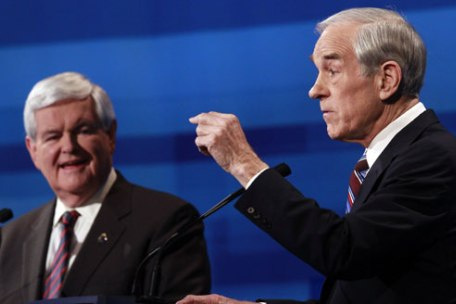Iran in the US Republican Presidential Primaries

In the last two weeks, during the Iowa and New Hampshire caucuses, there was much debate and discussion amongst the Republican candidates on a variety of topics, including Iran. There is no doubt that Iran has become an important topic of the Republican primaries, as every candidate bids to insinuate a more radical view on Iran; as if the fate of their candidacy depends on their policy on Iran.
As Obama is trying to ensure his reelection, he cannot ignore any of the topics that the Republican candidates emphasize. The question is, why has Iran turned into a topic of interest during these elections, how are they focusing on it, and what will the implications be? In answering, three significant facts should be considered:
Mounted Challenges and Limited Solutions:
International and domestic analysts have no doubt that the US is facing a host of economic, political, social, domestic and international problems; all of which are lacking immediate solutions.
Perhaps one of the most prominent issues in the US is the political difference between the two parties that has resulted in ineffective politics inside Washington. The tension between the two parties runs so deep and widespread that there are no immediate solutions to most of the problems. Moreover, neither of the parties has actually proposed a solid strategy to tackle US economic and social concerns.
The topic of Iran in US politics, however, is not tied to any of the current US challenges and is certainly not a solution to current US troubles. Mentioning Iran will not contribute toward the US’ economic recovery, nor will it mend the broken relationship of the two political parties in Washington. It won’t help with the current social crisis in the US, either.
In the absence of clear and effective solutions to fundamental US issues, Iran has turned into a topic for the Republican candidates to use against the Obama administration. The Republican candidates assert that the current Obama policies on Iran have been ineffective and approaches on Iran should become increasingly harsher.
Unquestionably, the Republican candidates are not disillusioned by that fact that that the topic of Iran is merely a diversion of public attention from the party’s lack of intellectual soundness to propose solutions to current structural and fundamental American challenges.
Of course, behind all this commotion regarding Iran are prominent players such as Israel, its supporters and allies, who attempt to intensify US involvement in a scheme against Iran.
Israel’s Role:
Analysts of strategic affairs believe that during the last decade there has been much change in Iran’s regional power balance and commonly agree on Iran’s increased regional dominance. This has caused much concern for Israel, as there is no doubt that its government seeks to restrain and eliminate rival Iran’s power.
Israeli strategists believe, however, that the country cannot curb Iran’s supremacy on its own. Therefore, since the early nineties Israel has tried to involve the US in another serious and bloody conflict with Iran. Isaac Shahak, a left wing Israeli scholar, pointed to this fact in an article written prior the US-Iraq war.
If the topic of Iran to the US Republican candidates is a diversion from fundamental issues within the US, to Israel it is a strategic goal in order to confine Iran’s influence and power-- by ensuring a US military intervention in Iran. It is interesting to point out that in recent years even some leading scholars in the US have expressed their concern regarding Israel’s meddling in US policy on Iran. The book “The Israeli Lobby” by John Mearsheimer and Stephen Walt points out this fact. Furthermore, Mark Perry, in a recent article published in Foreign Policy magazine points to Israel’s efforts to cooperate with Jundallah – also known as People’s Resistance Movement of Iran – against the government of Iran.
Historically the Republican Party has always expressed great affinity and support for Israel. In recent years, however, this affiliation has further increased; one way to evaluate an eligible Republican candidate is by his expressed regards toward Israel.
The Results Regarding Republican Debates on Iran:
Whatever the outcome of Israeli interference in Washington, it will result in more US pressure on Iran. During the past two years the Obama administration employed tough and hostile anti-Iran policies. In response to the Republican anti-Iran debates, the Obama administration is required to reinforce tougher policies on Iran to prove that it has not slackened its strategy on Iran.
Surely Iran will not keep silent during this unprecedented anti-Iran rhetoric and will react accordingly. Gary Sick – one of President Carter’s national security advisers – mentioned as much on Charlie Rose, saying that you cannot speak about a country so loosely and inaccurately and not expect that country to react regarding its national security. Recent discussions regarding military intervention in Iran that are the result of the ongoing anti-Iran debates have resulted in Iran and other international countries’ reaction. The expressed statements and positions on Iran cannot be viewed solely in terms of bilateral relations between Iran and the US. The global implications of these issues will have an effect on the world’s current structure, pushing it into a new phase.
* Seyyed Mohammad-Kazem Sajjadpour is a university professor and an International analyst.

